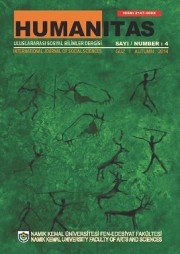PASTORAL ÇOCUKLAR: SYLVIA PLATH VE NİLGÜN MARMARA
PASTORAL CHILDREN: SYLVIA PLATH AND NILGUN
Author(s): Author Not SpecifiedSubject(s): Literary Texts
Published by: Namık Kemal Üniversitesi Fen-Edebiyat Fakültesi
Keywords: Feminism; Sylvia Plath; Nilgün Marmara; Identity.
Summary/Abstract: The philosophical, sociological and psychological developments of the 20th century regarding women have found their reverberations in literature. Turkish novelists, dramatists and poets have been in close touch with their western counterparts. This study tackles and problematizes gender and identity issues in the poems of Sylvia Plath (1932-1963) and Nilgün Marmara (1958-1987) who wrote her thesis on Sylvia Plath. The poems “Daddy” “Medusa”, “Lady Lazarus” by Plath and “Mezar”, “Kan Atlasõ”, “Kuşum ve Ben” by Marmara have been sociologically and psychoanalytically grappled in this study. Marmara and Plath who do not show many discrepancies in terms of personality, also share many common similarities on the basis of identity and gender issues despite the fact they came from different geographical locations. Both poets were interested in the same themes and motifs such as blood, father, family, alienation and loss. Both Plath and Marmara’s hatred –love relationship with their mothers, sense of guilt, repressed childhood memories, jealousy of their brother, death of the father, being idealized by their mothers, seeking for a soulmate, woman’s image, mother-daughter in conflict and suicidal attempts justify the female aesthetic of feminist criticism, that is why such a study is exemplary to show the gender issues and their reflections in literature.
Journal: Humanitas - Uluslararası Sosyal Bilimler Dergisi
- Issue Year: 2/2014
- Issue No: 04
- Page Range: 75-86
- Page Count: 11
- Language: Turkish

